Key takeaways:
- Engine tuning optimizes performance through adjustments in air-fuel mixture, ignition timing, and engine parameters, enhancing horsepower and fuel efficiency.
- Tuning personalizes the driving experience, turning mundane commutes into enjoyable journeys and unlocking hidden performance potential.
- Utilizing the right tools, such as standalone engine management systems and OBD-II scanners, is crucial for effective tuning and troubleshooting issues.
- Regular maintenance, including consistent oil changes and monitoring coolant levels, is essential for ensuring long-term engine performance and reliability.
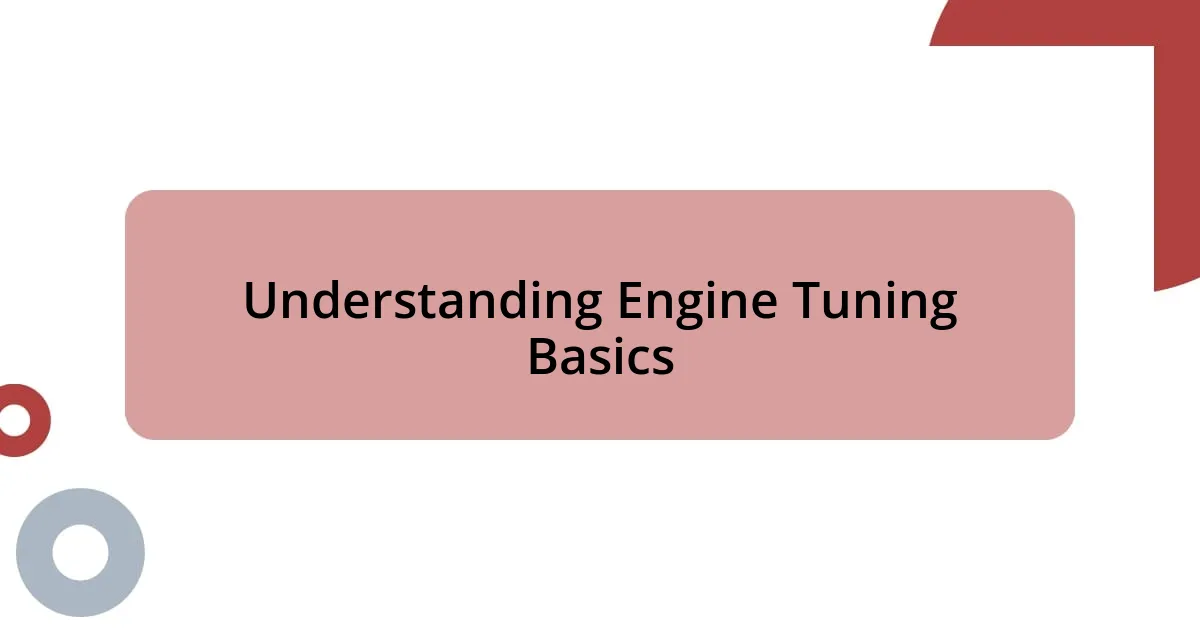
Understanding Engine Tuning Basics
Engine tuning, at its core, is about optimizing your engine’s performance to suit your driving style and needs. I remember the first time I tuned my car; it was an exhilarating experience. Instead of my engine just idling, I felt it come alive, responding to every touch of the throttle. Isn’t it incredible how tweaking a few settings can turn an ordinary drive into something extraordinary?
Diving deeper, tuning involves adjusting factors such as air-fuel mixture, ignition timing, and overall engine parameters. Such changes can profoundly affect how your vehicle performs on the road. For instance, when I experimented with the air-fuel ratio on my own ride, I noticed not just a boost in horsepower but also an improvement in fuel efficiency. Have you ever felt the difference in your vehicle after making a small adjustment? It’s often surprising how much impact minor tweaks can have.
Understanding engine tuning basics also means knowing your vehicle’s specifications and the precise modifications you want to achieve. It’s not just trial and error; it’s about informed decisions. I’ve found that knowledge is power in the world of tuning—knowing when to push your engine and when to hold back can save not just performance but costs in repairs down the line. What are the specific goals you have for your engine tuning journey?
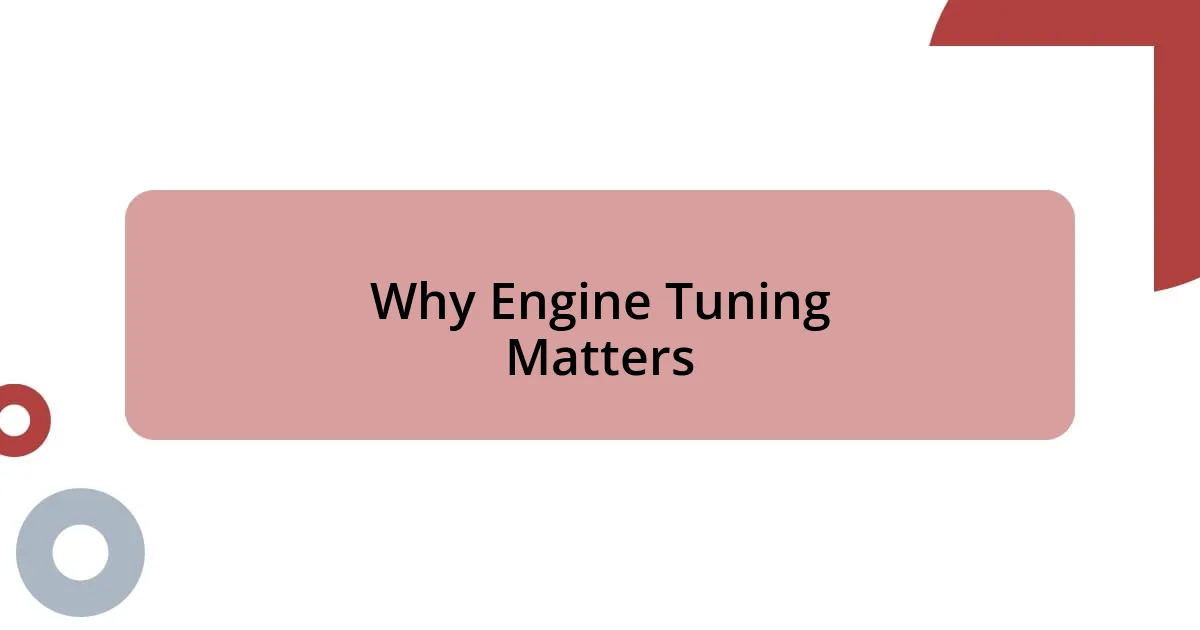
Why Engine Tuning Matters
Engine tuning matters because it allows drivers to tailor their vehicles to their unique preferences and needs. When I tuned my engine for better responsiveness, I felt a significant shift in how the car handled. Suddenly, every turn felt sharper and more precise, giving me a sense of connection with the vehicle that I hadn’t experienced before. This personalization can transform a mundane commute into an enjoyable journey.
Moreover, tuning can lead to tangible benefits like increased power and efficiency. I recall a time when I focused on fine-tuning my ignition timing; not only did I notice a considerable increase in acceleration, but I also saw a reduction in fuel consumption. It was like my engine had hit a sweet spot that was just waiting to be discovered. Have you ever adjusted something in your car only to realize how profoundly it changed the entire driving experience? The right tune can unlock potential you never knew was there.
Finally, understanding engine tuning is essential for performance enthusiasts—it’s about more than just speed. The thrill of extracting every ounce of performance from your engine can be a deeply satisfying pursuit. I’ve learned that tuning is as much an art as it is a science. It’s about finding the balance that suits your style, whether that means maximizing horsepower for track days or enhancing efficiency for everyday driving. What’s your approach to striking that balance?
| Aspect | Impact |
|---|---|
| Power Output | A well-tuned engine can deliver noticeably higher horsepower, improving overall performance. |
| Fuel Efficiency | Optimizing parameters often results in better fuel economy, saving money in the long run. |
| Responsiveness | A tuned engine often provides quicker throttle response, enhancing driving pleasure. |
| Longevity | Tuning can reduce strain on engine components, potentially increasing the vehicle’s lifespan. |
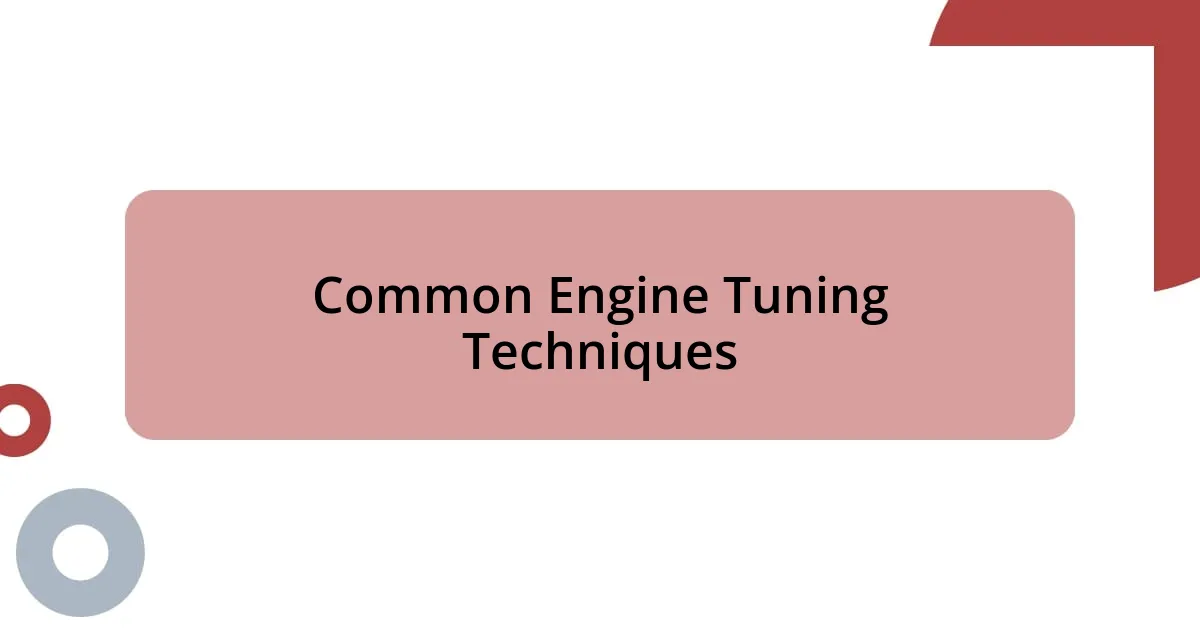
Common Engine Tuning Techniques
When it comes to common engine tuning techniques, I’ve found that each approach offers a unique pathway to performance enhancement. For instance, adjusting the air-fuel ratio can significantly influence combustion efficiency. When I tweaked this setting, I vividly remember how the engine responded; it felt like I was unleashing a hidden character in my vehicle. It’s amazing what a little fine-tuning can do.
Here are some techniques I often rely on:
- Air-Fuel Mixture Adjustment: Optimizing the blend promotes better combustion.
- Ignition Timing Modifications: Altering when the spark plug fires enhances power delivery.
- ECU Remapping: Customizing the engine control unit for precise performance targeting.
- Enhanced Intake and Exhaust Systems: Upgrading these can reduce bottlenecks and improve airflow.
- Performance Chips: Installing chips can deliver quick gains by optimizing various engine parameters.
These tuning techniques not only enhance horsepower but can also create a more engaging driving experience. It’s like knowing a secret that only a few get to unlock, and every tweak brings a wave of satisfaction as you feel that change in the roar of the engine.
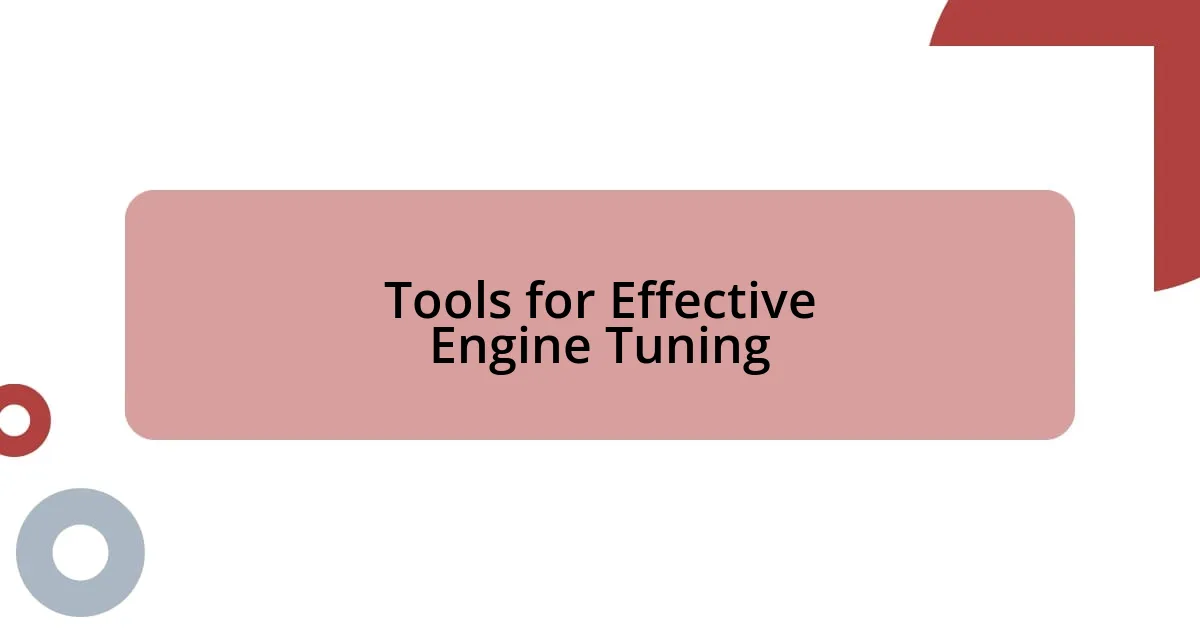
Tools for Effective Engine Tuning
Tools for Effective Engine Tuning
Having the right tools at your disposal is crucial for effective engine tuning. I remember the first time I invested in a standalone engine management system; what a difference it made! This tool allowed me to adjust parameters with precision that factory settings simply couldn’t provide. It felt empowering to finally have full control over my engine’s performance.
Another indispensable tool in my mechanic’s toolkit is an OBD-II scanner. It not only helps me diagnose issues but also provides real-time data during tuning. There’s something rewarding about watching those metrics shift as I make adjustments, almost like a game of chess with my vehicle. How can you not feel a rush when you see your horsepower numbers climb right before your eyes?
Lastly, I can’t speak highly enough about a quality dyno. Putting your vehicle on a dynamometer (or dyno) gives you concrete evidence of how your modifications impact performance. The first time I pulled my modified car onto a dyno, I was brimming with excitement. As the numbers flashed on the screen, I could hardly contain my enthusiasm. It’s a moment of truth that can fuel your passion for tuning, showing you exactly how much potential you’ve unlocked. So, what tools are you using to enhance your tuning journey?

Testing and Validating Tune Results
Testing and validating tune results is a pivotal step in the tuning process. After each adjustment, I take my vehicle for a spin to feel the changes firsthand. You know that moment when you hit the gas, and it’s as if your car has been rejuvenated? That’s the thrill of knowing you’ve made a meaningful tweak. I often check for throttle response and acceleration, which tells me a lot about whether my adjustments are hitting the mark.
During my testing sessions, I also rely on data logging to track performance metrics over time. It’s one thing to feel the difference, but having hard data to back it up is invaluable. I remember one instance where I thought I had hit a sweet spot with my air-fuel mixture. The data showed otherwise, revealing a lean condition that could have led to engine knock. Wouldn’t it be a nightmare to feel that power only to risk long-term damage?
Comparing my results on the dyno before and after tuning is another method I swear by. Seeing those numbers jump on the screen is almost mesmerizing. It’s not just about the horsepower; it’s about the entire driving experience that unfolds. The sheer joy of knowing your hard work has paid off is truly unmatched. Have you experienced that rush when the results validate your tuning efforts? It makes all those hours in the garage worthwhile.

Troubleshooting Engine Tuning Issues
When troubleshooting engine tuning issues, one of the first things I do is check for error codes using my trusty OBD-II scanner. I recall a frustrating afternoon when my car started to sputter unexpectedly. After connecting the scanner, it revealed a misfire code that led me straight to a faulty spark plug. It’s incredible how a simple scan can save you hours of guesswork and frustration. Have you had a similar experience where the right tool unveiled the problem right away?
If you’re still facing issues after addressing the codes, it’s time to look at your fuel delivery system. I once faced an issue with inconsistent acceleration, and upon investigation, I realized my fuel filter was clogged. It was such a relief to pinpoint the cause, as I had feared it could be a more complicated issue. Replacing the filter restored the smooth acceleration I’d craved, which made me appreciate how critical every component is in the tuning process. How often do we overlook the small parts until they become big problems?
Another key area to inspect is your air intake. I remember tuning my friend’s car and, despite making adjustments, it felt sluggish. A quick check revealed a damaged air intake hose. Once replaced, the car roared back to life! It’s moments like these that illustrate how interconnected our tuning efforts are. The smallest details can significantly impact performance. Have you ever overlooked something seemingly minor only to realize it was affecting your ride? It’s a humbling reminder to keep an eye on every aspect of the engine tuning.
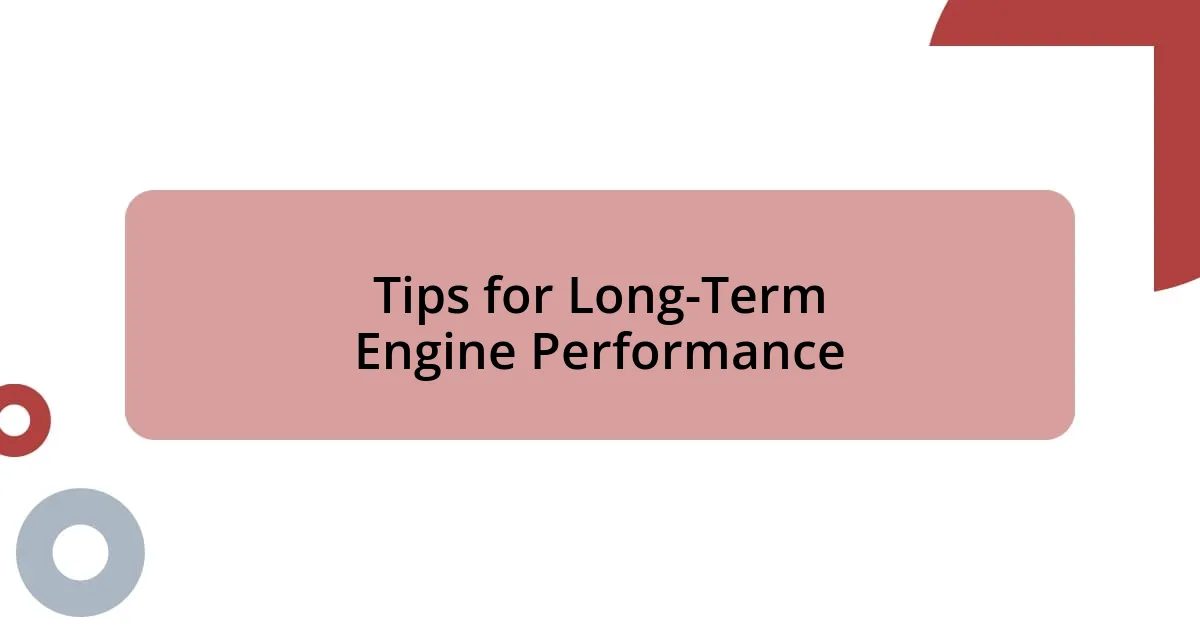
Tips for Long-Term Engine Performance
To ensure long-term engine performance, regular maintenance is key. I’ve learned that sticking to a consistent schedule for oil changes can make all the difference. I remember one time when I stretched the interval a bit too far; the engine started to sound like a coffee grinder. That’s a wake-up call I wouldn’t wish on anyone! Regularly checking and replacing the oil can keep your engine running smoothly and prolong its life.
Another tip I highly recommend is paying attention to coolant levels and the overall cooling system. There was a summer when I thought I could push my car without a cooling system check. I found myself pulled over on the highway, watching steam rise from under the hood. That felt like a scene out of a horror movie! Keeping an eye on your coolant not only prevents overheating but also protects key engine components from damage.
Finally, I suggest using quality fuel and additives suited for your specific engine setup. During my own tuning journey, I once experimented with a brand that promised more power but ended up with a rough idle. It taught me to stick with trusted sources that maintain engine cleanliness. Think about the last time you filled up your tank—did you truly check what you were putting in? Quality fuel goes a long way in keeping performance consistent and preventing long-term issues.














